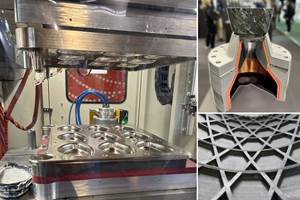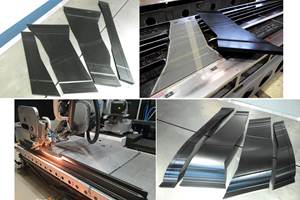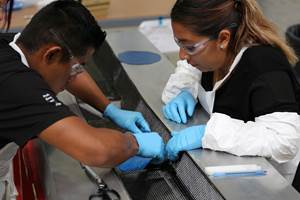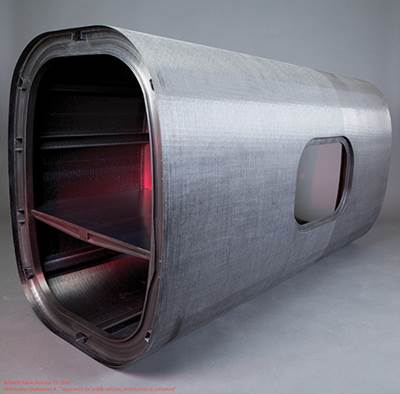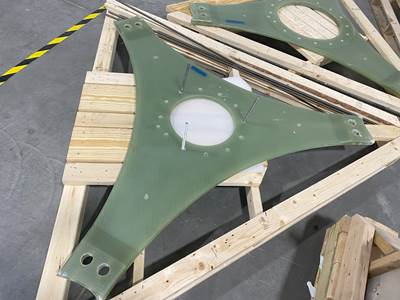Formable, reusable tooling achieves complex composite parts
CAMX 2024: Hawthorn Composites is displaying an inner and outer tail boom and a multi-chamber composite trailing edge control surface, enabled via its Smart Tooling solution.
Share
Hawthorn Composites and Smart Tooling (Miamisburg, Ohio, U.S.) is exhibiting multiple displays — including a sub-scale trailing edge and tail booms — that demonstrate its ability to produce high-quality, complex composite parts with Smart Tooling.
The first display includes the inner and outer tail boom for the PAL-V Liberty flying car, made by Hawthorn Composites. The tail booms are complex geometry composite parts with trapped features and some high-tolerance requirements, developed using carbon fiber prepreg laid up on Smart Tools using laser guidance. Once layup was completed, the Smart Tools were placed into cure molds and cured in a conventional oven; Hawthorn says they act like bladders during cure and were pressurized to drive out air and compact the laminate during the cure cycle.
The second display is a sub-scale, multi-chamber composite trailing edge control surface that was a proof of concept (POC) project for Pilatus Aircraft Ltd. (Stans, Switzerland). Results led to Pilatus adopting a similar method of manufacture for making the control surfaces for its PC-24 business jet.
The small trailing edge chamber of the control surface has an acute, knife edge angle that would traditionally be made using a fabricated foam core. For this POC control surface, however, the trailing edge chamber and the adjoining chamber were made using Smart Tools. The fabrication included laying up carbon fiber prepreg into a floating lid cure mold, laying up prepreg onto the Smart Tools and placing them into the cure mold. Once completed, cure was performed via autoclave.
The Smart Tooling technology enables a rigid, reusable, elastic and reformable mandrel that can ease the burden of layup, while still enabling simplicity of extraction from the cured, trapped or complex geometry composite part.
Related Content
-
Plant tour: Teijin Carbon America Inc., Greenwood, S.C., U.S.
In 2018, Teijin broke ground on a facility that is reportedly the largest capacity carbon fiber line currently in existence. The line has been fully functional for nearly two years and has plenty of room for expansion.
-
JEC World 2024 highlights: Thermoplastic composites, CMC and novel processes
CW senior technical editor Ginger Gardiner discusses some of the developments and demonstrators shown at the industry’s largest composites exhibition and conference.
-
3D-printed CFRP tools for serial production of composite landing flaps
GKN Aerospace Munich and CEAD develop printed tooling with short and continuous fiber that reduces cost and increases sustainability for composites production.
Related Content
Plant tour: Teijin Carbon America Inc., Greenwood, S.C., U.S.
In 2018, Teijin broke ground on a facility that is reportedly the largest capacity carbon fiber line currently in existence. The line has been fully functional for nearly two years and has plenty of room for expansion.
Read MoreJEC World 2024 highlights: Thermoplastic composites, CMC and novel processes
CW senior technical editor Ginger Gardiner discusses some of the developments and demonstrators shown at the industry’s largest composites exhibition and conference.
Read More3D-printed CFRP tools for serial production of composite landing flaps
GKN Aerospace Munich and CEAD develop printed tooling with short and continuous fiber that reduces cost and increases sustainability for composites production.
Read MoreComposites manufacturing for general aviation aircraft
General aviation, certified and experimental, has increasingly embraced composites over the decades, a path further driven by leveraged innovation in materials and processes and the evolving AAM market.
Read MoreRead Next
Building a better tail boom
Out-of-autoclave carbon fiber/thermoplastic demonstrator is a 30 percent lighter drop-in replacement for an existing aluminum design.
Read MoreRTM, dry braided fabric enable faster, cost-effective manufacture for hydrokinetic turbine components
Switching from prepreg to RTM led to significant time and cost savings for the manufacture of fiberglass struts and complex carbon fiber composite foils that power ORPC’s RivGen systems.
Read MoreAssembling the Multifunctional Fuselage Demonstrator: The final welds
Building the all-thermoplastic composite fuselage demonstrator comes to an end with continuous ultrasonic welding of the RH longitudinal fuselage joint and resistance welding for coupling of the fuselage frames across the upper and lower halves.
Read More






